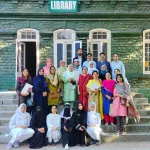PM Modi drives historic overhaul of 150-year-old Criminal Justice Laws: Amit Shah
Says be it Ram temple, Art 370, Triple Talaq or women reservation…we do what we say
Terrorists should be punished harshly & there is neither English rule nor Cong rule. It is Modi rule & no pretext to garb terrorism will be accepted
National security is paramount & disruptors of India’s Flag, borders, & resources to face jail
Using technology, we’re making India’s justice system the best in the world
NEW Delhi, Dec 20: In a watershed moment for India’s legal landscape, the Lok Sabha passed three transformative bills—Bharatiya Nyaya (Second) Sanhita, Bharatiya Nagarik Suraksha (Second) Sanhita, and Bharatiya Sakshya (Second) Bill—ushering in a new era for India’s criminal justice system. Union Home Minister and Minister of Cooperation, Amit Shah, responded comprehensively to discussions, providing intricate details about the monumental changes these bills bring.
Speaking in the Lok Sabha Shri Shah said that these laws are being brought at a time when the Indian Constitution is going to complete 75 years, when the Modi government has given women the right to 33% reservation. It is a matter of great pride that 150-year-old laws are being repealed to make way for new ones that will govern our criminal justice system and usher in transformative changes in it.
“These legislative measures, under the leadership of Prime Minister Narendra Modi, aim to replace outdated statutes such as the Indian Penal Code (IPC), Criminal Procedure Code (CrPC), and the Indian Evidence Act, 1872,” Shah said.
Amit Shah emphasised that the Bharatiya Nyaya Sanhita, 2023, will supersede the IPC, the Bharatiya Nagarik Suraksha Sanhita will replace CrPC, and the Bharatiya Sakshya Bill will overhaul the Indian Evidence Act.
The Home Minister elucidated that the changes are designed to shift the justice system from a punitive-centric approach, as seen in the 1860 IPC, to a more victim-centric, holistic model. He highlighted that these laws were crafted in alignment with the principles of the Indian Constitution, focusing on individual freedom, human rights, and equal treatment for all citizens.
Amit Shah provided detailed insights into the modifications introduced by these bills, including an increase in the number of sections, the addition of new offenses, changes in penalties, and the introduction of community service as a punishment. He emphasized that these laws reflect a departure from colonial-era biases, prioritizing justice in line with the spirit of the Constitution.
The Home Minister shared that these changes were the result of extensive consultations, considering 3200 suggestions in 158 meetings. The bills, sent to the Standing Committee of the Home Ministry on August 11, 2023, are now poised for implementation across the nation upon approval.
Union Home Minister Amit Shah announced that 35 MPs have expressed their views on the bills, emphasizing Prime Minister Narendra Modi’s call to eradicate the remnants of slavery. Shah highlighted Modi’s directive from the Red Fort to free the country from colonial laws, leading to intensive discussions by the Home Ministry since 2019. He noted that the new laws, rooted in the Constitution’s principles of individual freedom, human rights, and equal treatment, mark a departure from the punitive focus of the old laws.
Amit Shah outlined the government’s commitment to delivering on promises, including the abrogation of Article 370, a policy of zero tolerance against terrorism, the construction of the Ram Temple in Ayodhya, and the abolition of triple talaq. He asserted that these landmark legislations set the stage for a modern, victim-centric justice system, transparent, consistent, and time-bound.
Union Home Minister said that the Bharatiya Nagarik Suraksha Sanhita, which will replace CrPC, which has a total of 484 sections, will now have 531 sections. 177 sections have been changed, 9 new sections have been added and 14 sections have been repealed. The Bharatiya Nyaya Sanhita, which will replace the IPC, will now have 358 sections instead of the earlier 511 sections. 21 new offences have been added in it, the term of imprisonment has been increased in 41 offences, the penalty has been increased in 82 offences, mandatory minimum punishment has been introduced in 25 crimes, there are provisions of community service as a punishment in 6 crimes and 19 sections have been repealed. Similarly, the Bharatiya Sakshya Bill, which will replace the Evidence Act, will now have 170 sections instead of the earlier 167, 24 sections have been amended, 2 new sections have been added and 6 sections have been repealed.
Union Home minister said that after the Narendra Modi government came to power in 2014, the government that worked to implement its entire manifesto letter by letter, we had said that we would repeal 370 and 35. We had promised a policy of zero tolerance against terrorism, extremism, and freehand security for security personnel. We met all of these promises
Due to this, in Jammu and Kashmir, the northeast and the left wing affected region have seen peace. In Kashmir 63% reduction in violent incidents and 73% in deaths. In Northeast, 70% of area is free from AFSPA. In Ayodhya, we said we would build the Ram temple, and on January 22, the Ram Temple will be consecrated. This is Narendra Modi’s government we do what we say. We had said that we would provide 33% reservation for women in Parliament and Legislative Assemblies
Amit Shah said in the old laws, instead of giving priority to homicide and misbehaviour with women, priority was given to the protection of treasury, protection of railways and the safety of the British Crown. He said that in new laws crimes against women and children, matters affecting the human body, security of the country’s borders, crimes related to the Army, Navy and Air Force, electoral crimes, tampering with coins, currency notes and government stamps etc. are kept first. Shah said that for the first time under the leadership of Modi ji, laws are going to be made according to the spirit of our Constitution.
Amit Shah said that till now the work of computerising 97% police stations of the country has been completed through ICJS. He said that the courts are also being modernized and through ICJS, Forensic Science University, Police Station, Home Department, Public Prosecutor Office, Jail and Court are on the verge of going online under a single software. Along with this, smartphones, laptops, message websites and locational evidence have been included in the definition of evidence, and accused and victims have been allowed to appear before the court through electronic means.
“The definition of terrorism was not present in any criminal justice system law until now. For the first time, the Modi government is going to criminalize terrorism, so that no rogue can take advantage of it. Sedition has been changed into treason. Earlier you could not say anything against the government or any individual in a high post of the government. The new law shifts its focus from the individual to the nation. Any activity will be considered treason only if it is intended against the integrity, sovereignty and unity of the nation and not just because it is against the government. Anyone can say anything against the government, but if someone interferes with the country’s flag, security, or property, they will go to jail,” Shah said.
Union Home Minister Amit Shah said that the new criminal law bills have a provision of trial in absentia for those who are “hiding in other countries” for terror acts and other offences in India.
Amit Shah said if those hiding in other countries do not appear before the court within 90 days, then in their absence, trial will go on.
“Many may have objections to the provisions under trial in absentia. What sympathy can there be for someone who has committed a crime and fled the country? Whether it’s the Mumbai bomb blast or any other act of terrorism. They commit any crime and take refuge in countries like Pakistan or others. The question arises, should they be punished or not?”
The Home Minister said those evading trial by staying abroad should face legal consequences.
“Those people are hiding in other countries, and trials are not underway…Ninety days will be given for the accused to appear before the court. If they fail to do so, a public prosecutor will be appointed for their prosecution. This approach will not only expedite the legal process but also change their status in the other country when they are prosecuted. It will make the process to bring them back speedy.”
Shah said: “We are moving forward by utilizing all technology to ensure swift justice. Provisions have also been made for mob lynching. I was listening to Chidambaram in a speech; he was asking about the new law on mob lynching. Chidambaram Ji you neither understand our party nor our principles. Our party has only one ideology and it is India’s excellence. Mob lynching is a grave crime and we have made provisions for the death penalty.”
The Lok Sabha, through the passage of these bills, has not only brought about a comprehensive overhaul of the criminal justice system but has set the stage for a justice system aligned with the aspirations of a New India. The bills, once implemented, are poised to reshape the legal landscape, ensuring justice that is not only fair but reflective of the nation’s ethos and constitutional values.




